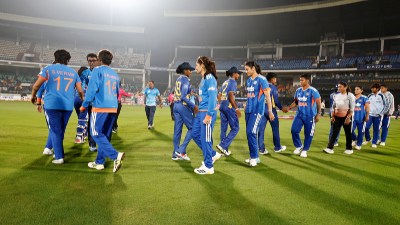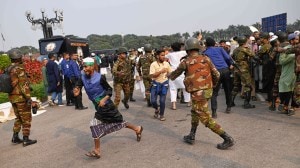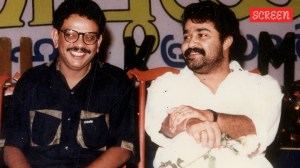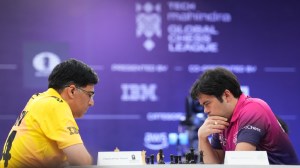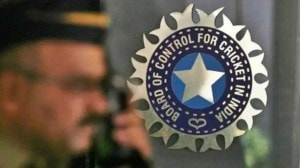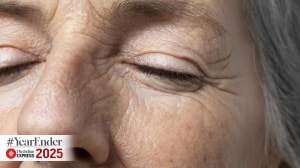Explained: South Korea’s Presidential Election 2022
Early voting began on Friday morning and the election process comes at a time when the country is facing one of its worst waves of the coronavirus pandemic pushed by the Omicron variant.
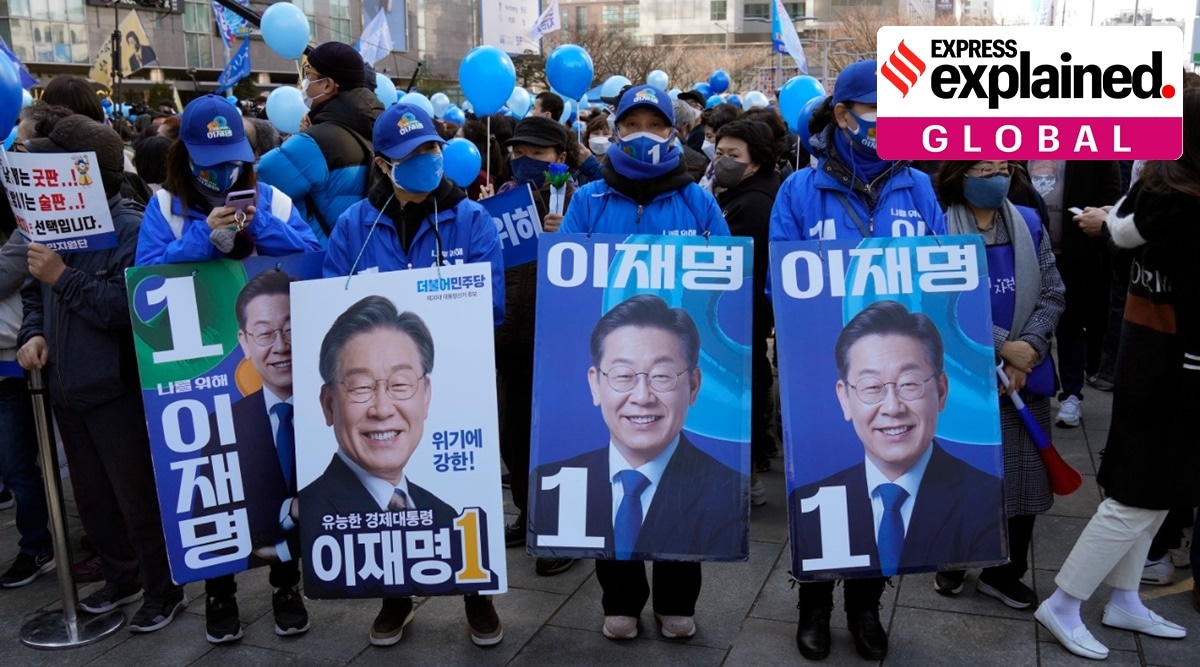 Supporters of Lee Jae-myung, the presidential election candidate of the ruling Democratic Party, hold banners during an election campaign in Seoul. (Photo: AP)
Supporters of Lee Jae-myung, the presidential election candidate of the ruling Democratic Party, hold banners during an election campaign in Seoul. (Photo: AP)
While the world’s attention has been focused on Russia’s invasion of Ukraine and the instability in the wider region, South Korea’s presidential elections are set to be held on March 9. Early voting began on Friday morning and the election process comes at a time when the country is facing one of its worst waves of the coronavirus pandemic pushed by the Omicron variant.
🗞️ Subscribe Now: Get Express Premium to access the best Election reporting and analysis 🗞️
So severe is the pandemic in the country that South Korea revised its election law last month to accommodate infected voters so that they could cast their votes, with the voters and booth officials using protective wear and sanitisers. This also comes at a time when the election race is tight with the candidates from the ruling and the opposition parties fighting neck to neck. But these campaigns have not just been defined by the havoc that rising Covid-19 infections have caused, but also how the campaign has focused more on highlighting the flaws and many scandals of the nominees.
Presidential candidates
Lee Jae-myung
The 57-year-old politician and civil rights lawyer served as the governor of Gyeonggi province, South Korea’s most populous province, between 2018 and 2021. He stepped down in 2021 to run for president once again. In 2017, while serving as the mayor of Seongnam, Lee ran for president, after former President Park Geun-hye was impeached on corruption allegations, but lost to the current President Moon Jae-in. It was during this time that Lee rose to political prominence in South Korea.
As governor of Gyeonggi, Lee received both praise and criticism for his handling of the Covid-19 outbreak and was also at odds with the central government in South Korea over several policy plans related to the pandemic.
Lee on socio-economic policy
Universal basic income is central to Lee’s policies. Under this scheme, Lee has said that he hopes to tackle growing inequality in the country. The focus on universal basic income comes at a time when South Korea has been witnessing a growing wealth gap. In their 2014 paper titled ‘Why Does Inequality in South Korea Continue to Rise?’, researchers Shin Kwang-Yeong and Kong Ju at Chung-Ang University, wrote in 2012, the Organisation for Economic Co-operation and Development (OECD) reported that the relative rate of poverty among the elderly in South Korea was, at 48.3 per cent, the highest of all of the OECD members.
 Lee Jae-myung, the presidential election candidate of the ruling Democratic Party, gestures during a presidential election campaign in Seoul. (Photo: AP)
Lee Jae-myung, the presidential election candidate of the ruling Democratic Party, gestures during a presidential election campaign in Seoul. (Photo: AP)
Some observers believe this inequality is only going to increase over the years as South Korea’s technological advancements further reduce labour positions, forcing people out of its labour force. The country has also been grappling with dissatisfaction among its youth, who struggle to find employment commensurate with their education and skills.
Lee on gender issues
Issues like feminism, women’s rights, LGBTQ rights have also been hot-button issues. While Lee previously said he was in favour of an anti-discrimination law “in principle”, in the run-up to the elections, LGBTQ rights activists say he has back-tracked to pander to the powerful conservative Christian voters and lobby who are strongly against the law.
The gender issue is another topic that has been important in these elections. In the run-up to the election week, Lee increased his outreach towards women voters, by making statements like “Feminism is also an attempt to make this world better,” during his campaign events in the country. In the early phases of Lee’s campaign, he had been successful in drawing women voters, but that changed when it was revealed that his party and family members were associated with cases involving sexual violence.
Lee on foreign policy
In his foreign policy proposal, Lee promised to continue in the direction of liberal presidents, particularly in the case of North Korea and Japan, outlining similar goals as Moon Jae-in and Kim Dae-jung.
Yoon Suk-yeol
The 61-year-old Yoon served as the prosecutor general of South Korea from 2019 to 2021 under President Moon Jae-in. He played a major role in the conviction of former President Park Geun-hye while he was the chief prosecutor of South Korea. Yoon is the nominee for the conservative People Power Party, which is also the main opposition party.
As election day inches closer, observers have drawn similarities between Yoon and former US president Donald Trump. People keeping track of Yoon’s statements during campaign events have particularly remarked on his style of speaking, sometimes difficult to comprehend. One of the most severely criticised remarks made by Yoon during his campaign involved what many interpreted as praise of former president Chun Doo-hwan, a military dictator known for his brutal treatment of pro-democracy protesters in the 1980s, for which he never apologised. Chun died last year at age 90.
A Korea Herald report cited Yoon saying that there were many people who believe that Chun “did well in politics” except for the “military coups” and what he did on May 18, 1980, when he brutally suppressed a pro-democracy uprising. Yoon was later forced to apologise for the remarks on Chun.
Yoon on gender issues
During an interview earlier this year, Yoon also said that “systematic gender discrimination no longer exists”, one in a string of anti-women remarks that the presidential hopeful has made. In August last year, while speaking on low birth rates in South Korea, Yoon said, “Some say feminism has been politicised to make it emotionally hard for men and women to date.”
Feminism and women’s rights have been demonised to such an extent over the past few years in South Korea that many conservative and conservative-leaning men have now started associating the terms with misandry and interpret discussions surrounding them as a “threat” to men’s rights and their place in the country’s social structure.
Some activists and researchers believe that these sentiments are linked with a misunderstanding of feminism itself, almost a demonisation of the term, that has driven ordinary to be afraid of being labelled feminists. One of his goals if he were to win, Yoon has said, is to remove the Ministry of Gender Equality and Family in South Korea, a campaign pledge that has been popular with his anti-feminist voter base, a Korea Herald report stated.
Women in South Korea face violence and abuse in various forms inside their home, as well as outside, where experts say that the country’s laws do not provide sufficient punishments for crimes against girls and women. Experts have said that the judicial system’s approach to crimes against women is linked to gender roles in the country’s patriarchal society. The stigmatisation of calls for greater emphasis on women’s rights has been popular with Yoon’s voter base who believe that he speaks for them.
Yoon on Seoul’s neighbours
According to a report by the Lowy Institute, Yoon has said that he will scrap the 2018 Comprehensive Military Agreement if North Korea continues on its present path and that an end-of-war declaration is not possible before denuclearisation. Last year, Yoon also openly criticised President Moon Jae-in’s Japan policy. In line with the conservative party, Yoon has specifically accused President Moon of being excessively deferential and subservient towards North Korea, vowing not to do the same. Instead, Yoon has suggested the establishment of a trilateral diplomatic office with representatives of both Koreas and the US.
Newsletter | Click to get the day’s best explainers in your inbox
Yoon has also spoken about Japan as an ally, a divergence from the normal domestic discourse, and has openly criticised the antagonistic relations that the present government has with Tokyo.
Yoon on foreign policy
Both candidates appear to have little foreign policy experience or even wider awareness, some experts believe. Most recently, Lee found himself facing criticism for saying during a televised presidential debate that Ukraine’s President Volodymyr Zelenskyy had “provoked” Russia by insisting on joining NATO, Reuters reported. The report added that Yoon faced a wave of criticism himself after he posted a “We stand with Ukraine” meme on social media that critics said was frivolous.
- 01
- 02
- 03
- 04
- 05



